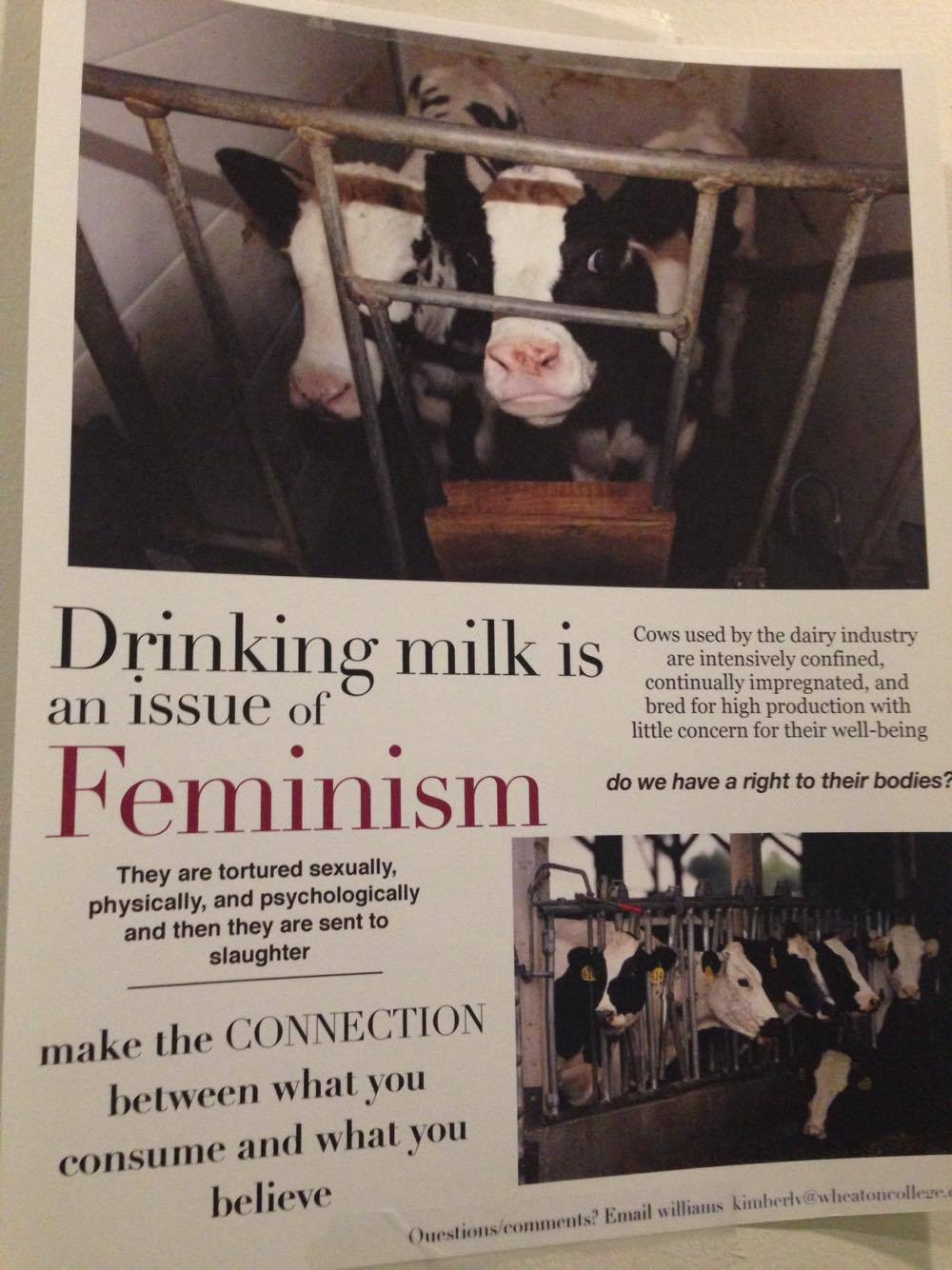Is drinking milk an issue of feminism? Yes, according to posters around campus that say ‘cows used by the dairy industry are intensively confined, continually impregnated and bred for high production with little concern for their well-being.’ One such poster urges people to make connections between what they consume and what they believe.
Kimberly Williams ’16 put up these posters as an ‘Outrageous Act’ for her Women’s Studies class. Williams connected the assignment that asked students to confront sexism or gender bias to her own fight for animal rights. “I want people to understand the connection between the all too common product of milk and the truth behind how it’s made on factory farms in America,” said Williams.
On the phrasing of the posters, “I chose milk because the cow is such as iconic image on milk cartons, dairy products. It’s sadly ironic that they use a happy cow on their products because the process of obtaining milk is horrific,” Williams said.
“Dairy cows are obviously female, and they are used and exploited because of their sex organs. To go further, these cows are kept in very dirty and cramped places, and are continuously inseminated. They need to be kept pregnant in order to produce the milk,” Williams said, “I think feminists everywhere would agree that this exploitation is wrong.”
“I’m glad they have these posters around but I’ve seen a lot of people just laughing at them because dairy is something that is very hard to cut out from your diet. I guess people are used to being informed about animal cruelty all the time so it doesn’t really bother them anymore,” Deki Selden ’17 said.
Others say that though important, this may not be a feminist issue. “The issue of milking relates more to our destructive capitalist methods of production than our feminist beliefs. The issue of milking highlights the implications of factory farming, and how we will do anything for money, even if that means torturing another living being just to satisfy intangible quotas, deadlines or numbers,” Shruti Sudarsan ’19 said.
“Calling yourself a feminist has been harder to do, as as extremists continue to forcefully push ideologies that take away attention from the most important concept: the equality of men and women. Yes, the dairy industry should be given more awareness, but smacking ‘feminism’ on a picture of a cow just makes me think that if I drink milk, I’m not a feminist,” Hanna Thieme ’17 said.
Lindsay Orchowski, assistant professor of psychology who has taught both intro to women’s studies and the psychology of women said, “feminist science and theory has long been concerned with objectification as well as issues relating to choice, cultural ideologies, power and the body. If we take a step back, it is possible to acknowledge links between each of these issues of violence, choice, cultural ideologies, power, and bodies in human treatment of animals as food sources.”
“Feminist theory and science is also rooted in a tradition of questioning the ‘status quo’, even when it comes to things that are seemingly mundane in our lives; like the food humans consume,” Orchowski said, “Public dialogue regarding a cultural phenomenon is often the first step in raising awareness. Perhaps these posters encourage folks to take a second look at the politics of their choices when it comes to food.”
“I would want people to start doing more research. People have no connection to their food today. Everything is packaged, and the food industry has gotten great at deceiving people,” Williams said on the aim of her project. She encourages others to watch the ‘Cowspiracy’ documentary on Netflix or read ‘Eating Animals’ by Johnathon Safran Foer.
Williams, a psychology major, said her career plans revolve around human services but could involve animal advocacy. “Either way, I also plan on educating people around me and urging them to do their own research. I also would love to make more educational materials and hand them out wherever I go. I’ll probably even be telling people to stop eating animal products even in my grave,” she said.

